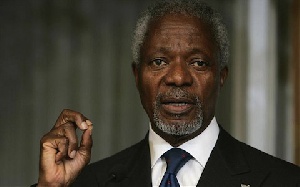Former UN Secretary General Kofi Annan has said Africa should not expect the West to solve the Continent’s problems.
The Ghanaian diplomat told the BBC recently that the West can only help to some extent but cannot solve the Continent’s problems.
Responding to a recent international outpouring of solidarity with French satirical magazine Charlie Hebdo, following an attack on its office by an Islamist militant group, which led to the killing of 12 journalists, vis-à-vis the apparent silence of the international community on the killing of hundreds of Nigerians in Baga by Islamist militant group Boko Haram, a few days earlier, Mr Annan said: “I think we have to be realistic, people always pay more attention to dangers which are immediate to them and threaten all of them.”
“The nature of that attack in Paris caused lots of tension in Europe. Other cities were saying: ‘What’s next, who is next?’ So there was a strong sense of that solidarity, with everybody coming together to make their position known,” Annan observed.
In his view, Africans should also begin showing such support to each other rather than expecting the international community to come solve their problems for them.
“What I wish is that we also, on this continent sometimes we show the same solidarity in support of each other to begin with and then expect the international community to come in.
“They can help, but they cannot solve the problems for us,” Annan stressed.
Boko Haram, which has a membership of between 6,000 and 8,000, was formed in 2002. It has killed thousands of Nigerian and caused the displacement of about 1.5 million people.
It recently, on January 3, 2015, killed, according to local reports, close to 2,000 people at Baga.
Nigeria’s defence ministry has, however, estimated the number of people killed to be not more than 150.
The terrorist group sacked the entire town during the attack. Some survivors fled to neighbouring Chad.
Last weekend, at least 23 people were killed by three female suicide bombers, one reported to be 10 years old.
In April 2014, the group kidnapped more than 270 schoolgirls in a village called Chibok.
Though some of the girls escaped to freedom, a lot more of them are still in captivity.
Apart from Chibok, several schools have been burnt, and students burnt alive in towns and areas in the northeastern part of Nigeria by the terrorist group which is averse to any form of Western education.
General News of Saturday, 17 January 2015
Source: starrfmonline.com













